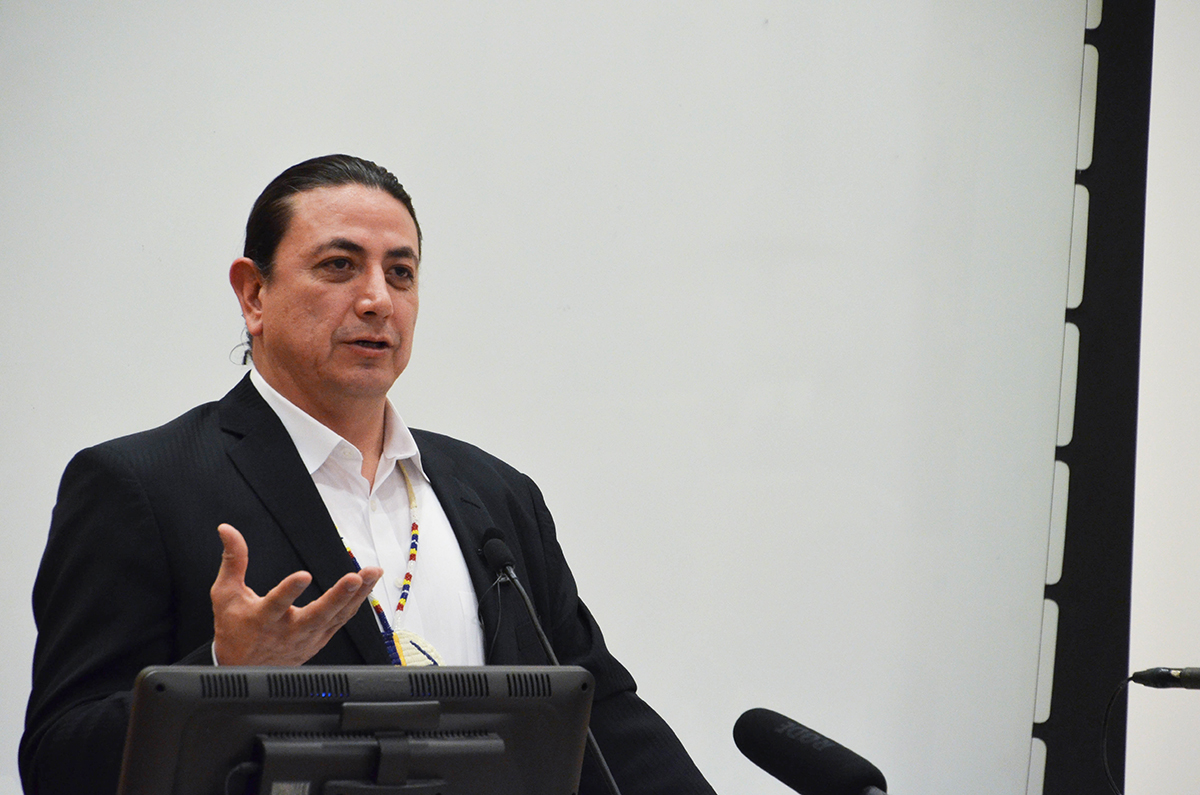Standing Rock leader decries pipelines on Sioux land
By Jeri Wall

“One of the things I want to do is make sure that we create the hope that is necessary for the future… As long as I put a focus on the future, I can sleep at night,” said David Archambault II, chairman of Standing Rock Sioux Nation.
Archambault spoke on campus Feb. 16 as part of the College of Agriculture and Life Sciences’ Department of Natural Resources spring 2017 seminar series. He outlined the history of interactions and treaties between the Sioux Nation and the U.S. government, dating to the early 1800s. While the Sioux Nation signed treaties to achieve peace, Archambault said, its history with the U.S. federal government has shown that treaties are often not honored.
He outlined the downward trajectory of federal government policies that have impacted Standing Rock Sioux Nation, including: land-grabbing of the Black Hills in the 1800s; the Wounded Knee Massacre of 1890; construction in the 1940s and 1950s of the largest dam in the world, which flooded Standing Rock lands; the forced removal of children from their homes to boarding schools; and denial of opportunity to use the Sioux language.
Today, Archambault said, five of the 10 poorest counties in this country are largely populated by members of the Great Sioux Nation, and two are in Standing Rock Reservation, which covers parts of North Dakota and South Dakota.
“With poverty comes all the symptoms: high suicide rates, abuses, alcoholism, drug use, lack of housing, lack of law enforcement,” he said.
In 2003, Archambault said, the oil industry boom in North Dakota brought crime and drugs such as cocaine, heroin and meth – and that sparked the beginning of the community’s opposition to pipelines.
“In 2007 our tribe said we don’t want pipelines in our ancestral lands,” he said. “We saw not only the bad in the social ills, but also the environmental ills of unregulated pipelines and fracking water.”
In 2013, Standing Rock passed resolutions against the Keystone XL Pipeline.
“Our focus has been on our children,” Archambault said. “We can invest in our kids… and create the brilliant minds that will solve all the things that plague us. If we invest in them, they will have the answers in the future.”
Vocal opposition to the Dakota Access Pipeline grew among the youth of Standing Rock. Archambault said the phrase “We don’t want oil in our water” was the first call to action by the young people when, in 2014, Energy Transfer Partners tried to persuade the tribal council to commit Standing Rock land for the Dakota Access Pipeline.
“When our kids speak up, it’s time for us to support them,” he said. “They are saying, ‘I want to learn the language, I am proud to be Indian, it’s cool to be Indian.’”
The pipeline, Archambault said, would traverse a source for its drinking water (Lake Oahe, a large reservoir behind Oahe Dam on the Missouri River), and that construction would disrupt its hunting and fishing grounds, and its sacred lands.
“Our argument is that we never had an opportunity to have a say in the scoping of the Dakota Access Pipeline,” he said. “If we did, we would say, ‘Stay out of our treaty lands because there are sacred places there.’”
In 2016, Standing Rock Sioux Nation filed a court case to stop the Dakota Access Pipeline construction on its ancestral lands. The nation continues litigation in federal court in Washington, D.C., Archambault said, to challenge the actions of the Army Corps of Engineers, undo the approval of the pipeline, and enforce its federally protected treaty rights for water, hunting and fishing.
“We are going to continue the fight,” Archambault said, ending his talk with an invitation to join in solidarity with indigenous peoples for the “Rise with Standing Rock” march in Washington, D.C., March 10.
The seminar was sponsored by the Department of Natural Resources; co-sponsors included Cornell’s American Indian and Indigenous Studies Program and the Office of the Vice Provost for International Affairs.
Jeri Wall is director of communication for the Office of the Vice Provost for International Affairs.
Media Contact
Get Cornell news delivered right to your inbox.
Subscribe